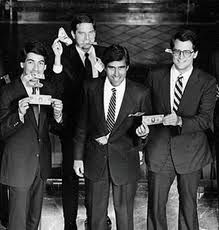Some are likely born leaders, but there aren’t nearly enough to go around, so we better be able to teach important leadership skills. Warren Bennis, who wrote the book on corporate leadership (30 of them, actually), began focusing on the topic in the 1950s and lived long enough to see the rise of the “job creator,” a species he wished extinct. From an Economist piece about the recently deceased theorist:
“Mr Bennis believed leaders are made, not born. He taught that leadership is a skill—or, rather, a set of skills—that can be learned through hard work. He likened it to a performance. Leaders must inhabit their roles, as actors do. This means more than just learning to see yourself as others see you, though that matters, too. It means self-discovery. ‘The process of becoming a leader is similar, if not identical, to becoming a fully integrated human being,’ he said in 2009. Mr Bennis knew whereof he spoke: he spent a small fortune on psychoanalysis as a graduate student, dabbled in ‘channelling’ and astrology while a tenured professor and wrote a wonderful memoir, Still Surprised.
What constitutes good leadership changes over time. Mr Bennis was convinced that an egalitarian age required a new style. Leaders could no longer crack the whip and expect people to jump through hoops. They needed to be more like mentors and coaches than old-fashioned sergeant-majors. Top-down leadership not only risked alienating employees. It threatened to squander the organisation’s most important resource: knowledge. There is no point in employing knowledge workers if you are not going to allow them to use their knowledge creatively.
The last quarter of the 20th century often saw Mr Bennis in despair. He loathed the Masters of the Universe who boasted about how many jobs they had nuked and how much money they had made. On Becoming a Leader is full of prophetic warnings about corporate corruption, extravagant executive rewards and short-termism. He also lamented the quality of leadership in Washington, DC.”
Tags: Warren Bennis

